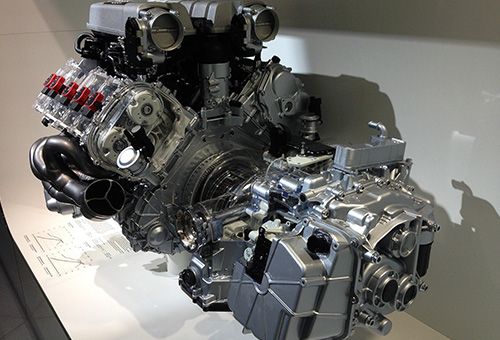Top Quality Checked Used Engines for Sale: Save Cash and Drive Securely
Top Quality Checked Used Engines for Sale: Save Cash and Drive Securely
Blog Article
A Comprehensive Guide on What to Try to find When Acquiring Used Engines
When thinking about a made use of engine purchase, a methodical approach is vital to avoid unanticipated complications. The procedure starts with a precise background check, looking at the Car Recognition Number (VIN) and maintenance documents for any type of warnings. Past background, assessing gas mileage offers understandings right into the engine's past life. Compatibility with your car is non-negotiable, as is an extensive physical assessment for any type of signs of wear. Equally vital is an understanding of readily available service warranty options, which can offer comfort. These initial actions are simply the start of guaranteeing your financial investment is both sound and safe and secure.
Engine History Check
When thinking about the purchase of a used engine, performing a complete engine background check is a crucial action in making certain a reliable and worthwhile investment. A thorough history check consists of validating the engine's recognition number (VIN) to verify its authenticity and to map its beginning.
Additionally, recognizing the upkeep records is vital. These papers reveal just how well the engine has been looked after, showing normal oil modifications, part replacements, and adherence to supplier guidelines. Consistent upkeep is a solid sign of an engine's possible sturdiness and performance.
An additional critical facet is examining any kind of previous events or repair work. Understanding whether the engine has actually formerly suffered damage, such as from an accident or flooding, can provide insight into potential future troubles. Fixings, even if professionally done, may influence the engine's reliability.
Finally, a recall check must be conducted to guarantee there are no unsettled producer recalls, which might signify fundamental issues with the engine model. This diligent technique to evaluating the engine's history safeguards against unexpected failures and expensive repairs.
Examining Gas Mileage
Although mileage is not the single indicator of an engine's condition, it remains a critical aspect to think about when assessing an utilized engine. High mileage usually suggests considerable use, which can bring about damage on parts such as pistons, bearings, and seals. It's important to acknowledge that an engine with modest or even high gas mileage might still be in good problem if it has been well preserved. Thus, recognizing the context of the mileage is crucial.
When evaluating mileage, think about the type of automobile and its normal use. Freeway miles are generally less taxing on an engine than city driving, which entails constant stops and starts. In addition, engines in cars made use of largely for hauling or lugging hefty tons may experience much more anxiety, potentially minimizing their life-span despite lower gas mileage.
It's likewise suggested to compare the engine's gas mileage with the industry standard for similar engines. This comparison can give beneficial understanding into whether the engine has actually been subjected to normal usage or extreme wear. Eventually, while gas mileage is an essential factor to consider, it must be reviewed along with upkeep documents and overall engine problem to make an enlightened acquiring choice.
Compatibility Confirmation
Ensuring compatibility is a critical action when purchasing an utilized engine. Before choosing, it is important to validate that the engine appropriates for your automobile's make, model, and year. This includes examining the engine code, an one-of-a-kind identifier that has to correspond to your car's specs. Dissimilar engine codes can cause considerable mechanical concerns or Click Here perhaps full conflict.

Furthermore, analyze the engine place kinds to ensure they line up with your lorry's installing points. Misaligned installs can trigger setup problems and operational concerns. Consulting the lorry's solution handbook or a vehicle specialist can offer guidance in verifying these components. Constantly validate compatibility with any kind of added elements, such as turbochargers or exhaust This Site systems, which might vary between engine versions. Comprehensive compatibility verification is important to stay clear of pricey errors and make sure seamless engine combination.
Inspecting Physical Condition
Assessing the physical condition of an utilized engine is an essential facet of the buying process, as it straight affects the engine's efficiency and durability. Begin by conducting a complete visual inspection. Look for any noticeable signs of deterioration, such as fractures, damages, or deterioration on the engine block and its elements. Pay particular attention to areas around the cylinder head and the oil frying pan, as these are usually vulnerable to damage.
Take a look at the problem of the belts and pipes for any type of signs of fraying or fracturing, which can suggest age or previous overheating issues (used engines for sale). Check the engine mounts to ensure they are undamaged and without too much wear, as faulty installs can influence engine stability and efficiency
In addition, scrutinize the shade and uniformity of the oil. Dark, sludgy oil may suggest inadequate maintenance, while milky oil might recommend the presence of coolant, hinting at possible head gasket concerns. Also, look for any kind of signs of leaks, especially around seals and gaskets, which can signal underlying problems.
Understanding Warranty Options
When acquiring a used engine, understanding the service warranty alternatives readily available is critical to guarding your financial investment. A guarantee offers a safety net, making certain that you are shielded against unpredicted defects or malfunctions.
Beginning by determining the length of the warranty period (used engines for sale). Some guarantees might provide insurance coverage for 30, 60, or 90 days, while others can expand as much as a year. The period of protection can commonly reflect the vendor's self-confidence in the engine's condition. Pay attention to what the service warranty explicitly covers-- does it include labor other expenses for repairs, or exclusively the replacement of defective parts? Understanding these nuances can assist you make notified decisions.
Additionally, check out any kind of exclusions or voiding problems. Particular warranties might become void if the engine is set up poorly, or if particular maintenance procedures are not adhered to. Guarantee that you have a clear understanding of your duties to maintain the guarantee's legitimacy. By thoroughly examining service warranty options, you can protect satisfaction and safeguard your investment in a made use of engine.

Final Thought
Performing a thorough evaluation when purchasing a made use of engine is paramount to guaranteeing a sound investment. Validating the engine's recognition number and evaluating upkeep documents supply understanding right into its history and upkeep. Assessing mileage in context help in understanding its previous use. Compatibility contact the desired car are crucial, as are complete inspections for physical wear or damage. Comprehending warranty choices, including their range and restrictions, is critical in safeguarding against unforeseen issues and expenses.
Report this page